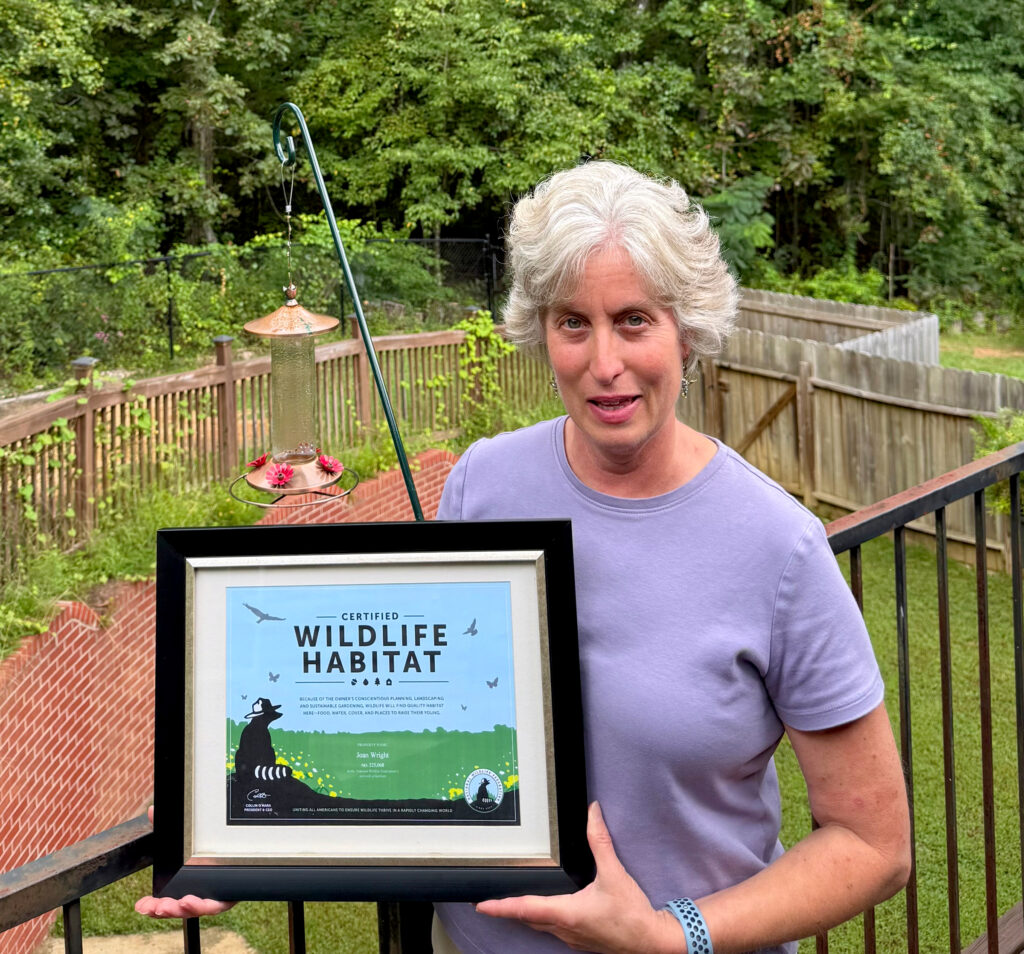Certified Wildlife Habitats Support Native Plants, Creatures
For Joan Wright, the decision to create a welcoming habitat for wildlife and an inviting space for native plants and trees came … well, naturally.
Wright and her husband, Carl, who are members of Coosa Valley Electric Cooperative, have had their property certified by the National Wildlife Federation as an official wildlife habitat. Such habitats provide natural sources of food, water, cover and places for wildlife to raise their young, and are maintained in a sustainable way that incorporates native plants, conserves water and doesn’t rely on pesticides.
Joan says one of her favorite things to do is to sit on the deck of their home and look over the backyard, which is surrounded by woods. She got involved with the NWF through the Wild Birds Unlimited store in Hoover, her favorite place to shop for birdseed for the feeders in her yard. After she learned about the program and gave it some thought, she filled out a quiz from the NWF along with some information about her home and environment, and they sent her a certificate.
“I create spaces and natural items that can draw animals to a place, where they can live and grow and beautify our area,” she says.
Her favorites are birds – she can have as many as 15 hummingbirds a day in her four feeders – but they also have hawks, mourning doves, bluebirds, finches and cardinals, in addition to foxes, deer, rabbits, butterflies and “lots of little bees.”
Being outside extends to the Wrights’ vacations as well. “We enjoy the outdoors as a family,” she says. “When we go on trips and vacations, we’re usually looking for adventures that are outside. We do kayaking, canoeing, river floats, hiking and fishing.”

In addition to providing a safe environment for animals, certified habitat homeowners promote natural, native plants, and work to keep out such invasive species as kudzu and privets.
“Find out what kind of plants, flowers, trees and shrubs are native to your area,” Joan says. “Plant those, because that’s what’s going to be better for the wildlife habitat – that they have vegetation, shrubbery and places to eat, house, nest, protect themselves and their young from predators.” She suggests working with local gardening clubs or master gardeners to get started.
The NWF also encourages the limited use of pesticides and herbicides. In the Wrights’ backyard, rather than putting down plastic landscaping barriers or weed killers, which can be harmful to water sources, Joan takes old cardboard boxes, breaks them down and uses them as a weed barrier in flower beds.
“It doesn’t cost me anything. It’s not putting chemicals into the soil. (Those) eventually go into our runoff water and affect the plant habitat, which affects the animals’ habitat,” Joan says.
She continues to add to her landscape. A neighbor is preparing to do an expansion of her home, which will require the removal of many native plants. Joan asked if she could dig them up and bring them to her own property instead of throwing them out. “They can come to my property and continue to be enjoyed and provide places where (wildlife) can prosper.”
She says that homeowners don’t have to have acres and acres of land in the middle of nowhere to create their own personal wildlife preserve. Even a small piece of property can become a wildlife paradise.
“That’s really what the NWF is about,” she says. “They want to encourage people to foster these natural habitats in their own communities, in their own yards.”
For more information about the program, visit nwf.org/garden, and follow the National Wildlife Federation’s social media channels on Facebook and Instagram.




